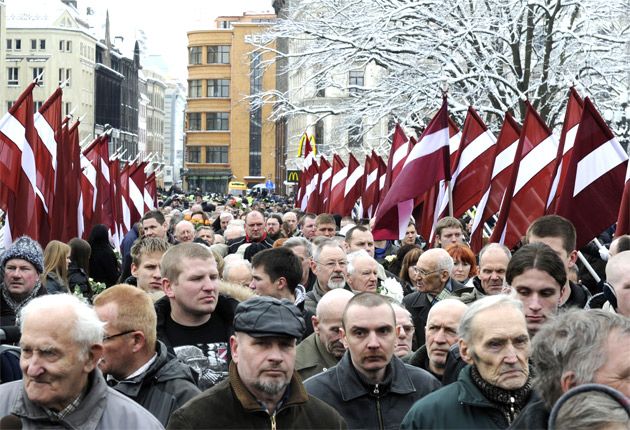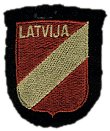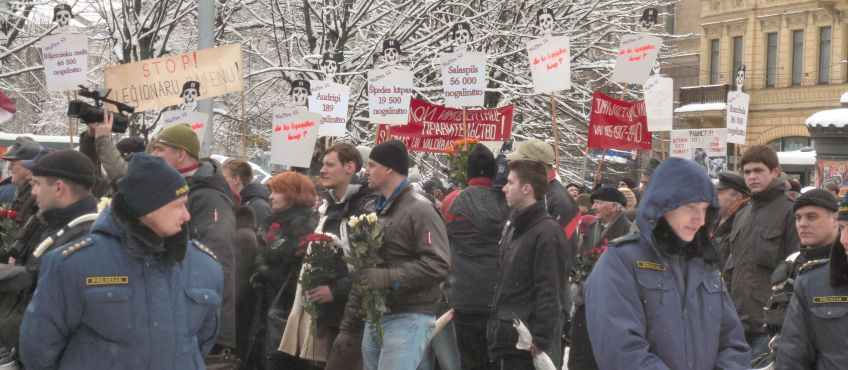Originally posted at www.independent.co.uk, published March 17, 20101
1Thousands pay tribute to Latvia's fallen Nazi troopsTories' European allies back march despite protests by Jewish groups
 Flanked by flags, supporters march to the freedom and fatherland monument in Riga yesterday to honour the Latvian Waffen-SS legion
Flanked by flags, supporters march to the freedom and fatherland monument in Riga yesterday to honour the Latvian Waffen-SS legionThey turned out in their hundreds despite the snow: grizzled old men in overcoats and thick anoraks. Nearly all of them were in their late eighties and many hobbled on walking sticks. 2Watched by more than 1,000 blue-uniformed riot police, they brandished red-and-white Latvian national flags and barked out patriotic wartime "warrior songs" that echoed ominously through the narrow streets of Riga's old town.
The march, by some 350 surviving former members of Latvia's Nazi Waffen-SS division and more than 2,000 of their supporters, looked like an act of collective octogenarian defiance. In many ways, it was.
Only hours earlier, Efraim Zuroff of the Simon Wiesenthal Centre, the man currently considered to be the world's leading Nazi hunter, had called on Latvia to ban public celebrations marking the country's controversial Legionnaires' Day, calling it an "attempt to rewrite history". He was backed by Jewish groups, Holocaust memorial organisations and by 3Nils Usakovs, Riga's ethnic Russian Mayor, who insisted: "It is a bit difficult to claim to be a hero if you were fighting for the Nazis." But at the last minute, Riga's district court overturned the ban after judges agreed that a city which last year permitted a controversial gay pride parade could not in all fairness prohibit a march by former Waffen-SS men.
4Controversy has always surrounded Latvia's so-called Legionnaires' Day. It marks the anniversary of a 1943 battle in which two Latvian divisions of some 30,000 Waffen-SS troops inflicted defeat on the Soviet Red Army. This year, however, the occasion has put the spotlight on David Cameron's Conservative Party, which is politically in bed with the event's backers. The Tory leader's decision to remove his party from the centre-right bloc in the European Parliament has realigned the Conservatives with questionable right-wing groups such as Latvia's Fatherland and Freedom party, which helped to organise yesterday's parade.
After an emotional church service held in Riga's 14th-century cathedral, 5more than 2,000 Nazi veterans and their supporters were allowed to march freely through the snowbound streets of the city. Flanked by hundreds of Latvian flags, they placed flowers and Waffen-SS memorabilia at the foot of the city's 1930s-built freedom and fatherland monument, which was erected to celebrate Latvia's post-First World War independence.
6A large gang of young ethnic Russians represented the other side. They brandished placards bearing the words "Waffen-SS" and the names of Latvian villages where atrocities against Jews were committed by Latvian Waffen-SS members during the war. Some 75,000 Jews were murdered in the country during the Nazi occupation. "It is disgraceful that these people should be allowed to march here," said one of them, called Mikhail, in his early thirties. "All the Russians are against it," he insisted.
Riga's inhabitants, who number close to a million, are equally divided between Russians and Latvians. Yet the Russian anti-Waffen-SS protesters were in the minority during yesterday's celebrations. In Riga, a capital city that was part of the Soviet Union until 1990, anti-Soviet resentment remains high. "These Waffen-SS veterans were fighting for the liberation of Latvia," said one respectable-looking man in his fifties. "They have a right to their celebration."
That view is echoed by 86-year-old Visvaldis Lacis, one of 140,000 Latvians who fought on the German side during the Second World War. Mr Lacis was drafted into the Waffen-SS in 1943 and insists he was fighting for an independent Latvia. He points out that Latvians were prohibited from joining the regular German army and were only permitted to serve in Waffen-SS "legions".
"The Germans and Russians invaded Latvia for centuries and incorporated us into our empires," he said. "We chose the lesser of two evils because during the German occupation, the Germans killed or deported 18,000 Latvians, whereas the Russians killed or deported 300,000. Were we not right to make such a choice?" he asked.
7Many Latvian SS veterans insist that they were not party to atrocities. However, Jewish groups point out that Latvian police were recruited by the Germans and took part in the Holocaust. They were responsible for the mass execution of Jews after the Nazi invasion in 1941. These men later willingly joined the Waffen-SS. Historians point out that they were involved in a war against so-called "partisans" which almost certainly involved mass shootings.
8"With all my sympathy for the victims of Communism, the crimes of Communism are simply not the same as the Holocaust. Part of this is fuelled by a desire to deflect attention away from the extensive collaboration with the Nazis during the Second World War," Mr Zuroff said. "They thought they were fighting for Latvia but the real beneficiary of these men's service and bravery was Nazi Germany."
The LNNK: Cameron's awkward ally
When David Cameron promised to pull the Conservative Party out of the centre-right coalition that sits in the European Parliament, he may not have expected to find himself in a new grouping with the Fatherland and Freedom party. The Latvian group's celebration of SS veterans is nothing new, but its potential to cause political headaches for Mr Cameron can only increase in an election year.
One of the oldest parties in Latvia, the LNNK, as it is also known, has been represented in parliament since 1993. Its most prominent figure is Juris Dobelis, a Latvian nationalist who commemorates the country's Waffen-SS men every year. To Mr Dobelis, this marks his country's proud resistance against the Russian army; to many foreign critics, it looks like apologism. Foreign Secretary David Miliband has called the Conservatives' connection with the Fatherland and Freedom party "sickening". In reply to that remark, Mr Dobelis last year insisted Mr Miliband was "wrong". "He does not know the history of Latvia," he said.
9Efraim Zuroff, the Simon Wiesenthal Centre's chief Nazi hunter, also criticises the LNNK, saying the party's support for the commemorations is an effort to "whitewash the villains, dishonour the victims, and rob the heroes of their well-deserved pride". LNNK leader Roberts Zile rejects that charge, insisting that his group does nothing to celebrate Nazism. To say otherwise, he wrote, "is simply absurd".
Examination
Paterson's article goes awry at its headline. No Latvian Legionnaires were ever members of the Nazi party. Nor was the Latvian Waffen-SS the same as Hitler's elite Waffen-SS, which was convicted of war crimes at Nuremberg. Paterson smears Latvians as Nazis, and moves on from there.
Paterson conjures up imagery of riot police protecting the populace against rabid Nazi octogenarians. Paterson projects his notion of Nazism on to patriotic Legionnaire songs — which speak only to their love of Latvia. One Legionnaire song does specifically tell the tale of post-WWI independence, hoping for a repeat: drive the Russians out, and then drive the Germans out.
Ušakovs' statement is unsurprising, given his party's ties to Moscow and his expression of support for Russia's so-called restoration of Crimea in 2014. Of course, Ušakovs — ушаков (Ushakov) — would denounce anyone fighting against the Soviet Union as fighting "for" the Nazis since both his grandfathers were Soviet generals in World War II. We suspect Ušakovs's ancestors include Fyodor Ushakov, the most famous Russian naval commander, never defeated, and canonized in 2000.
An outright lie. It cannot be repeated enough that the current "controversy" is a manufacture of post-Soviet Russia pouring gasoline on a fire it set — so it could now appoint itself as fireman. Commemoration of the Legionnaires has nows been observed for 72 years. Until it was declared a national holiday after the restoration of Latvia's independence, and Russia launched its intense anti-Latvian propaganda campaign, there had been not a single complaint. Any true controversy would have manifested long before commemoration could first be openly observed in Latvia after half a century of Soviet occupation.
Paterson again invokes the imagery of a jack-booted Nazi threat descended upon the streets of Rīga, perverting Latvia's Freedom Monument to the purpose of Nazism.
The Waffen-SS—Latvian Legion—did not commit any atrocities. No one has ever been accused of a war crime while in the service of the Latvian Legion. The Russian "anti-Nazi" protesters who appear annually are affiliated with the Kremlin's World Without Nazism organization, which has perverted the legitimate cause of anti-Nazism to attack its neighbors as fascist states. Josef Koren, co-chairman of the Anti-Fascist Committee of Latvia, and the face of anti-Fascist leadership at the annual commemorations, is a Kremlin-funded lackey.
There are several aspects to be addressed here.
Collaborators — There is no dispute or defense of the complicity or guilt of Arajs Kommando, the most notorious collaborationist unit, or police auxiliaries who participated in the Holocaust. Arājs's unit numbered 300-500 during the Holocaust in Latvia, some 1,200 in later actions in Byelorrussia. Anyone who fought on the Eastern front, including those men who volunteered to pursue the retreating Red Army after Nazi occupation, was not involved in the Holocaust. That includes the battalions which later formed the core of the Latvian Legion.
Collaborators who "willingly joined" the Latvian Legion — In truth, Legionnaires loathed collaborators for being "cowardly rats" intent on avoiding combat.
More generally, there was no "willing." By the end of the war, the Nazis had conscripted every Latvian male born after 1905. Latvians were deployed as cannon fodder as the Soviets advanced. When a major attack was imminent, the Germans retreated and sent in the Latvians, who were far more determined to save their homeland. Latvian veterans' diaries speak of German artillery batteries which refused to fire for fear of being discovered when the Soviets attacked Latvian units.
As already mentioned, not a single individual has been accused of any war crime while in the service of the Latvian Legion. Not even collaborators. Not even in Soviet show trials.
With regard to a related and frequent accusation, it bears repeating from the above that no one "excuses" the crimes of collaborators because at some point the Nazis re-deployed them on the Eastern Front against the Red Army.
Falsely accused as collaborators in Soviet show trials — The facts of the actions of Latvian Police Battalions, such as the 18th—convicted in a Soviet show trial—its officers executed—and today accused of killing all of Slonim, Belarus' Jewish inhabitants, are clouded in Soviet propaganda. German records unequivocally detail the Germans themselves slaughtered Slonim's Jews before the Latvians ever arrived, and that the KGB manufactured Soviet archival "evidence" to implicate Latvians.
We would add that the Khrushchev-era KGB established an entire Directorate dedicated to attacking Latvians as Nazi collaborators via disinformation.
Zuroff's comments often feature prominently in pieces on the Latvian Legion commemoration. The Holocaust and Gulag were both paths to death. Hitler's targeting of and means of inflicting industrialized genocide on the Jews has defined the Holocaust as uniquely and unspeakably evil. But to say that Latvians—indeed all of post-WWII "Eastern Europe" are seeking to deflect attention away from their "extensive collaboration" by calling attention to Stalin's genocide is false self-righteous rhetoric. There is no contest attempting to equate genocides.
The sole moral question to raise regarding Nazism, Communism, and alleged "equating" is this: Do we value the lives lost differently whether they rode to their deaths in Hitler's or Stalin's cattle cars? Does Zuroff contend that Gentile lives are not as worthy as Jewish lives? Of course not. Thus, Zuroff ignores the bridge of mutual suffering under totalitarianism to build a unified community to stand against all future genocides. Instead, Zuroff has condemned all the peoples of post-WWII "Eastern Europe" for the success of the Holocaust, thanks to fanatic support by the native population.2 Zuroff's own writings cast doubt on his expression of sympathy for the victims of Communism.
Regarding what the Legion were fighting for, they knew what that was. It was not for Nazi domination of the world and the end of Western civilization. We should not discount Legionnaires' hopes of a repeat of the miracle of independence only a generation prior because hindsight informs us those hopes were doomed. In pursuit of such hopes, the Latvians held out in Courland until the end of the war—where the Red Army suffered 394,000 wounded, dead, and missing attempting to eradicate them. Given the chance, the Latvians would have turned on and held out against the Germans — again — as well. Latvian appeals for support in restoring independence fell on deaf ears while combat lasted an entire week following the end of the war.
Paterson concludes with an an apt summary of the polarization of views. The litmus test is the question of motivation. Zuroff is categorically wrong to contend Latvian Legion commemoration is in any way or manner linked to Nazism or its glorification, or an attempt to "whitewash" the crimes of collaborators.
We featured Zīle's assessment of Commemoration Day and Zuroff's objections in our 2009 review.
Behind the headline
We located a photo of the Russian protesters and their placards accusing the Waffen-SS of war crimes.3. How many are the Latvian Legion alleged to have killed, and where?
| Location | Alleged victims | Historical record |
| Biķernieki forest | 46,500 | The Germans claimed 30,000 victims at the largest site of total Holocaust murders in Latvia; of these, Viktors Arājs, the leader of Arajs Kommando, was eventually charged with responsibility for the deaths of 1,670. |
| Audriņi | 189 | Germans killed the town's inhabitants, approximately 200, after a family hid a member who was a Red Army soldier and the townsfolk had engaged in an armed skirmish with police. Residents were mostly Orthodox Russians. |
| Sķēde dunes, Liepāja | 19,500 | 2,749 were documented killed at the dunes in the largest single anti-Jewish action in Liepāja; estimates are that as many as 5,000 of Liepāja's 5,700 Jews were killed. Germans and Latvian collaborators participated in the killings, which also victimized communists and Gypsies. |
| Salaspils | 56,000 | 1,200 to 2,000 victims of multiple ethnicities died at Salaspils; prisoners included Latvian Legionnaires the Germans found guilty of military crimes. Soviet era propaganda alleged 100,000 civilians and 200,000 Russian POWs dead (300,000 total) which included 12,000 children experimented on and killed — all false. |
| Rumbula | 36,000 | 25,000, the largest single massacre of Jews on Latvia's territory, all killed by Friedrich Jeckeln's hand-picked German squad of a dozen men, conducting the mass execution in two shifts of six shooters at a time. |
The Latvian Legion had no role in the Holocaust, per Efraim Zuroff (2012).
At the very end, Paterson sets out opposing positions in a more factual fashion than a number of other accounts and commentaries. However, we cannot excuse Paterson's painting of Legionnaires as "Nazi troops" who needed to be watched over by riot police as they "brandished" the Latvian(!) flag during their "march", nor his characterizing patriotic Legionnaire song as sinister "barking."
Paterson reports primarily on European politics, including developments in the pursuit of Holocaust perpetrators.
| 1 | Tony Paterson's article published at www.independent.co.uk/ |
| 2 | Efraim Zuroff, Beruf: Nazijäger. Die Suche mit dem langen Atem: Die Jagd nach den Tätern des Völkermordes, Ahriman, Freiburg 1996, p. 44 and following. |
| 3 | At clemensheni.files.wordpress.com/ |

